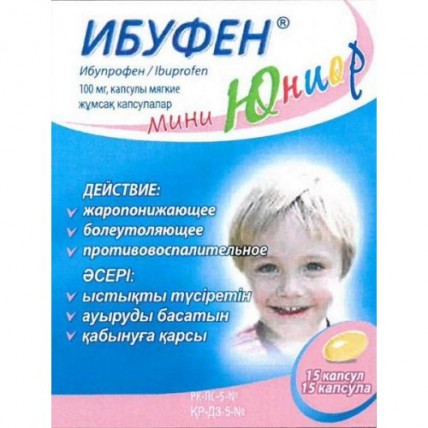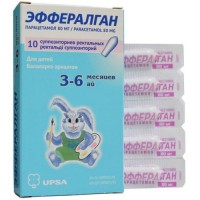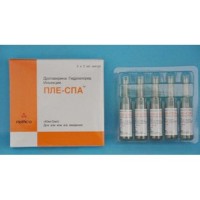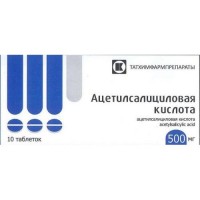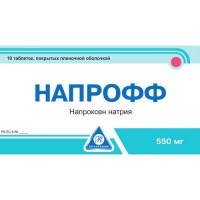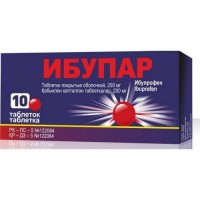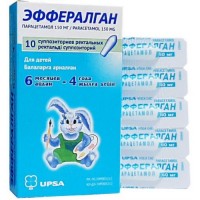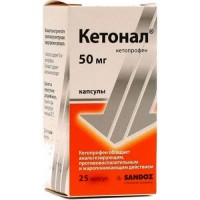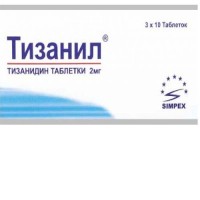Ibufen Mini Junior 100 mg soft capsules 15's
- $5.90
The instruction for medical use of medicine
Ibufenum pass the Junior
the Trade name
Ibufenum pass the Junior
the International unlicensed
name Ibuprofen Dosage Form
of the Capsule soft 100 mg
Structure
One capsule contains
active agent: ibuprofen of 100 mg
excipients: a macrogoal 600, potassium hydroxide, water the cleaned capsule cover: gelatin, sorbitol liquid (uncrystallized), maltitol liquid, the water purified
the Description
Soft capsules of light yellow color with a seam, contents of capsules - viscous liquid.
Pharmacotherapeutic group
Anti-inflammatory and antirheumatic drugs. Non-steroidal anti-inflammatory drugs. Propionic acid derivatives. The ibuprofen
the ATX M01AE01 Code
the Pharmacological
Pharmacokinetics Maximum Concentration properties of an ibuprofen in serum is reached in 1-2 hours after reception on an empty stomach.
Food reduces absorption of an ibuprofen, but does not reduce its biological availability, (tmax) increases for 30-60 minutes, than after reception on an empty stomach and makes 1.5-3 hours. The ibuprofen for 99% contacts proteins of plasma. The main proteins connecting drug is albumine. The ibuprofen and its metabolites are quickly and completely brought out of an organism by kidneys. Elimination half-life of drug makes about 2 hours.
The pharmacodynamics
the Ibuprofen is nonsteroid anti-inflammatory medicine (NPVP) which slows down synthesis of prostaglandins at inflammation. The ibuprofen reduces the pain connected with an inflammatory state, hypostasis and fever. Besides, the ibuprofen slows down in the reversible way, the induced ADF and collagen aggregation of thrombocytes.
Researches specify that the ibuprofen can oppress the action of low doses of acetylsalicylic acid based on slowing down of aggregation of thrombocytes if these drugs are used at the same time. Some pharmakodinamichesky researches specify what after introduction of a single dose of an ibuprofen (400 mg) within 8 hours to or within 30 minutes after administration (81 mg) of acetylsalicylic acid of immediate release, is noted reduction of influence of acetylsalicylic acid by formation of thromboxane or aggregation of thrombocytes. Despite the lack of confidence that these data can be extrapolated to clinical situations, it is impossible to exclude that regular, long use of an ibuprofen can limit cardiotyre-tread action of low doses of acetylsalicylic acid. It is considered that sporadic use of an ibuprofen has no essential clinical value.
Indications
Feverish conditions of various genesis (also in viral infections, at vaccine-challenged reaction).
Pains of various etiology and intensity from easy to moderate:
- the pain syndrome at symptoms of cold and flu
- a headache (also migraine)
muscular and rheumatic pains
- a toothache
- neuralgia
- ear pain in average otitis
- a dorsodynia
the Route of administration and doses
Medicine is intended for use for children aged from 4 up to 12 years with the body weight from 16 to 39 kg.
The maximum daily dose of an ibuprofen for children makes 20-30 mg/kg of body weight, in 3-4 receptions.
Children aged from 4 up to 5 years (16 kg up to 19 kg): An initial dose - 1 capsule. Then, in case of need, on 1 capsule in 6 hours.
The maximum daily dose makes 4 capsules (400 mg of an ibuprofen).
Children aged from 6 up to 9 years (20 kg up to 29 kg): initial dose 1-2 capsules. Then, in case of need, on 1-2 capsules in 8 hours.
The maximum daily dose makes 6 capsules (600 mg of an ibuprofen).
Children aged from 10 up to 12 years (30 kg up to 39 kg): initial dose 1-2 capsules. Then, in case of need, on 1-2 capsules in 6 hours.
The maximum daily dose makes 8 capsules (800 mg of an ibuprofen).
The minimum interval between the subsequent doses makes 6 hours.
The medicinal product should be accepted at meal time or after meal. The capsule should be swallowed entirely, washing down with a glass of water. Capsules should not be chewed, rassasyvat or crushed.
In case of need uses of a medicinal product more than 3 days or strengthenings of symptoms, it is necessary to see a doctor.
Drug is intended for symptomatic treatment.
Reception of a medicinal product in a minimal effective dose in the shortest possible time necessary for mitigation of symptoms, reduces risk of side effects.
Patients with a renal failure:
With a renal failure from easy to moderate degree the dose decline is not required from patients.
Patients with an abnormal liver function:
With an abnormal liver function from easy to moderate degree the dose decline is not required from patients.
Side effects
At short-term use of an ibuprofen in the doses released without prescription observed the side effects provided below. Use of an ibuprofen at other indications can cause other side effects for a long time.
Side effects are distributed on emergence frequency using the following definitions: very often: & ge, 1/10, is frequent: & ge, 1/100, & lt, 1/10, infrequently: & ge, 1/1000, & lt, 1/100, is rare: & ge, 1/10,000, & lt, 1/1000, is very rare: & lt, 1/10,000, frequency is unknown (it is impossible to define on the basis of available data).
Infrequently (1/1000 to & lt, 1/100)
- allergic reactions with skin rash and an itching
- an abdominal pain, nausea, dyspepsia
Seldom (1/10000 to & lt, 1/1000)
- vomiting, a meteorism, diarrhea, a constipation
- a headache, dizziness, insomnia, excitement, irritability, feeling of fatigue
it is Very rare (& lt, 1/10000)
- heavy hypersensitivity reactions: edema of face, language and a throat, an asthma, tachycardia, arterial hypotension (anaphylaxis, a Quincke's edema or heavy shock)
- bronchial asthma, exacerbation of bronchial asthma and a bronchospasm
- a round ulcer, a perforation of the ulcer or bleeding from digestive tract, a melena, vomiting blood (sometimes with a lethal outcome, especially at elderly patients), a stomacace, gastritis, exacerbation of ulcer colitis and Crohn's disease, an esophagitis, pancreatitis
- a disorder of vision
- sonitus
- hemopoiesis disturbances (anemia, a leukopenia, thrombocytopenia, a pancytopenia, an agranulocytosis)
- appearance of hypostases, arterial hypertension, heart failure in connection with use of drugs from the NPVP group
- an acute renal failure, papillonekroz (especially at long reception), the urea associated with increase in blood serum and hypostases
- abnormal liver functions, especially during prolonged use, hepatitis, jaundice
- is possible development of severe forms of skin reactions, such as bullous reactions, including a mnogoformny erythema, a toxic epidermal necrolysis, StivensaDzhonson's syndrome
- symptoms of aseptic meningitis: stiff neck, a headache, nausea, vomiting, fever or disturbance of orientation, especially at patients with the preexisting autoimmune disorders (system lupus erythematosus, the mixed disease of connective tissue)
- psychotic reactions, a depression.
Results of clinical trials assume presence of possible interrelation between reception of the ibuprofen which is especially accepted in high doses (& ge, 2400 mg a day), and the small increased risk of development of the arterial trombotichesky phenomena (for example, a myocardial infarction and a stroke).
At emergence of side effects it is necessary to stop drug use.
Contraindications
- hypersensitivity to an ibuprofen or other components of drug and also to other nonsteroid anti-inflammatory medicines
-
it is impossible to use existence in the anamnesis of reactions of hypersensitivity (bronchial asthma, a bronchospasm, rhinitis, rinosinusit, recurrent polyposes of a nose or near-nasal bosoms, a Quincke's edema, urticaria) connected with use of acetylsalicylic acid (salicylates) or other NPVP - a digestive tract canker (peptic ulcer of a stomach and duodenum, ulcer colitis) - gastrointestinal bleedings - existence in the anamnesis of gastrointestinal bleeding or perforation, connected with therapy of NPVP - heavy heart failure (NYHA IV) - a hemorrhagic vasculitis - blood diseases (tendency to bleedings, hemophilia, hypocoagulation) - a heavy renal or liver failure - expressed dehydration (as a result of vomiting, diarrhea or insufficient consumption of liquid) - cerebrovascular bleedings or other active bleedings - hemorrhagic diathesis, the obscure disturbances of the haematogenic system - children's age up to 4 years Medicinal interactions the Ibuprofen (as well as other drugs from the NPVP group) together with the medicines provided below:
- acetylsalicylic acid: at combined use with an ibuprofen the action of small doses of acetylsalicylic acid which is slowing down aggregation of thrombocytes can be broken. Follows from clinical data that the ibuprofen accepted along with small doses of acetylsalicylic acid can slow down the action preventing aggregation of thrombocytes. However the provided data are limited and ambiguous. After their extrapolation ex vivo on clinical cases becomes obvious that it is impossible to draw unambiguous conclusions of rather regular use of an ibuprofen, but in case of one-time reception of an ibuprofen it is considered that significant clinical interaction is absent,
- other nonsteroid anti-inflammatory medicines in view of the increased risk of side effects,
- diuretic and antihypertensive drugs (in particular AKF-inhibitors and antagonists of angiotensin II): the ibuprofen can reduce diuretic and antihypertensive action. At some patients with a renal failure (e.g. in a condition of dehydration or elderly) combined use of NPVP with AKF-inhibitors or antagonists of angiotensin II can lead to strengthening of a renal failure, up to an acute renal failure (most often reversible). Therefore, it is required to appoint with care the combined treatment, especially at patients at advanced age. In case of such patients the hydration and strict monitoring of function of kidneys at the beginning of a course of treatment is shown and also periodically during therapy,
- antitrombotichesky medicines: follows from not numerous clinical data that NPVP can strengthen the effect of drugs reducing blood clotting
- lithium and a methotrexate: proved that non-steroidal anti-inflammatory drugs can cause increase in concentration in plasma both lithium, and a methotrexate, it is recommended to control concentration of lithium and a methotrexate in serum,
- a zidovudine the patients accepting in common an ibuprofen and a zidovudine have proofs of lengthening of duration of bleeding
- corticosteroids the risk of side effects from a GIT increases,
- not numerous data on the possible interaction including the increased risk of toxic impact on kidneys are available cyclosporine
- digoxin simultaneous use of an ibuprofen with the drugs containing digoxin can increase concentration of these drugs in blood plasma. Control of concentration of digoxin in serum is not the routine requirement at usual use of drug (at most 4 days),
- takrolimuzy the increased risk of toxic impact on kidneys is possible,
- antitrombotichesky drugs and selective serotonin reuptake inhibitors (SSRI) the increased risk of gastrointestinal bleedings is possible,
- NPVP mifepristone it is impossible to accept within 8-12 days after mifepristone use as NPVP can weaken its action,
- antibiotics from group of hinolon researches on animals proved that NPVP can increase risk of the spasms connected with antibiotics from group of hinolon. The patients accepting in common NPVP and hinolona are subject to the increased risk of developing of spasms,
- the glycosides applied in heart diseases: NPVP can strengthen symptoms of heart failure and increase concentration of glycosides in plasma,
- aminoglycosides: can weaken function of kidneys at patients with tendency to a renal failure, reduce removal of aminoglycosides and increase their concentration in serum,
- probenetsidy: can reduce metabolism and removal of drugs from the NPVP group and their metabolites,
- orally taken anti-diabetic medicines: decrease in metabolism of derivatives of sulphonylurea, lengthening of elimination half-life and increase in risk of a hypoglycemia is possible.
Special instructions
At use of a medicinal product it is necessary to be careful at patients with:
- a system lupus erythematosus and other general diseases of connective tissue,
- diseases of an anus and rectum,
- GIT diseases and also chronic inflammatory bowel diseases (ulcer colitis, Crohn's disease),
- a hypertension and (or) heart failure,
- a renal failure (it is necessary to check function of kidneys as as a result of use of NPVP its deterioration is possible),
- a liver failure,
- insufficiency of fibrillation (the ibuprofen can extend a bleeding time).
- directly after surgical intervention
- at patients with pollinoses or obstruction of airways in the anamnesis as there is at them a risk of development of allergic reactions.
Patients at advanced age have a risk of emergence of side effects (generally bleeding and perforation) as a result of intake of medicine more, than at young patients. Frequency of emergence and intensity of side effects can be reduced, applying the minimum therapeutic dose in the shortest effective time. Prolonged use of NPVP at patients at advanced age is not recommended.
At persons with bronchial asthma and other allergic diseases, active or in the anamnesis, administration of drug can cause a bronchospasm.
There is a risk of bleeding from a GIT, an ulceration or perforation which can be deadly and to which the warning symptoms not always precede. The risk exists also at those patients at whom these warning symptoms were observed. In case of bleeding from a GIT or an ulceration it is necessary to stop administration of drug immediately. Patients with GIT diseases in the anamnesis, especially older persons, have to be informed on need to inform the doctor of any atypical symptoms from a GIT (in particular about bleeding), especially during an initial stage of therapy. Such patients have to accept the minimum dose of medicine.
With care it is necessary to use medicine at the patients who are in common taking other medicines which are potentially increasing risk of gastrointestinal disturbances or bleeding, e.g. corticosteroids and antitrombotichesky drugs as warfarin or anti-aggregation as acetylsalicylic acid.
In case of bleedings from a GIT or an ulceration at the patients accepting Ibufenum, drug treatment should be stopped.
Intake of the anti-inflammatory / anesthetizing medicines, such as an ibuprofen, can be followed by slight increase of risk of developing heart attack or stroke, especially at reception in high doses. It is not necessary to exceed the recommended doses and duration of treatment.
The patient should discuss treatment with the doctor before reception of an ibuprofen if:
- has cardiovascular diseases, including heart failure, stenocardia (stethalgia) and also if had a myocardial infarction, operation on coronary vessels, a stroke of any type (including a mini-stroke or the tranzitorny ischemic attack of TIA) or has a disease of peripheral arteries (bad circulation in the lower extremities owing to narrowing or obstruction of arteries).
- has the increased arterial blood pressure, diabetes, high level of cholesterol in blood, diseases of a cardiovascular system at family members, or when smoking.
Combined prolonged use of different analgeziruyushchy medicines can lead to injury of kidneys and risk of developing of a renal failure (post-analgetic nephropathy).
At prolonged use of high doses of analgetics, headaches which it is impossible to treat are possible, increasing a sedative dose.
At patients with the appointed long course of treatment it is regularly necessary to check function of kidneys, a liver and the haematogenic system.
Heavy skin reactions, some of them from the death, including exfoliative dermatitis, Stephens-Johnson's syndrome and a toxic epidermal necrolysis connected with use of medicines from the NPVP group were noted extremely seldom. The biggest risk of these heavy reactions arises at the beginning of therapy, in most cases within the first month of use of drug. At emergence of the first symptoms: skin rash, injury of a mucous membrane or other symptoms of supersensitivity, administration of drug should be stopped.
In separate exceptional cases heavy skin infections and infections of soft tissues as complications in chicken pox are possible. Now it is impossible to exclude influences of drugs from the NPVP group on strengthening of these infections. So it is recommended to avoid use of an ibuprofen for having chicken pox.
It is proved that the medicines braking cyclooxygenase (synthesis of prostaglandins) can cause disturbances of fertility in women, influencing an ovulation. This action has temporality and stops after completion of therapy.
There is a risk of a renal failure at the dehydrated children and teenagers.
In view of the fact that at use of an ibuprofen separate cases of a toxic amblyopia were noted, it is necessary to inform the doctor on any visual disturbance.
Medicines from the NPVP group can mask symptoms of an infection and fever.
The overdose
After reception of a dose more than 200 mg/kg of body weight is available risk of toxic action. Adults have a dose capable to cause such symptoms is not defined definitely. Elimination half-life at overdose makes from 1.5 to 3 hours.
Symptoms. At most of the patients accepting clinically significant doses of NPVP are possible: nausea, vomiting, pain in epigastriß area or diarrhea. Can also arise: sonitus, a headache and bleeding from a stomach or intestines. The serious poisoning influences the central nervous system and causes drowsiness, and is extremely rare also excitement and a disorientation or a coma. Convulsive attacks are very seldom possible. In heavy intoxication sometimes observe a metabolic acidosis, and increase in a prothrombin time of INR is possible. Were noted also: acute renal failure or injury of a liver. At patients with asthma the aggravation of its symptoms is possible.
Treatment. The corresponding antidote is absent. The symptomatic and supporting treatment is performed. Observation of cardiac performance and control of symptoms of activity of an organism is shown if they are stable. In case of frequent convulsive attacks with the increasing duration it is necessary to enter diazepam or lorazepam intravenously. Patients with asthma should give the medicines expanding bronchial tubes.
The form of release and packing
On 15 capsules place in blister strip packaging from aluminum foil and a film polyvinylchloride / polyvinyldichloride (PVC/PVDH Is scarlet/).
On 1 planimetric packing together with the instruction for medical use in the state and Russian languages place in a cardboard pack.
To Store storage conditions in original packing at a temperature not over 25C.
To store out of children's reach!
2 years
not to apply a period of storage after expiry date.
Prescription status
Without prescription
the Producer
of Medan JSC Pharm, Poland
the Owner of the registration certificate
of JSC Khimfarm,
the Address of the organization accepting in the territory of the Republic of Kazakhstan claims from consumers on quality of products
of JSC Khimfarm, Shymkent, Republic of Kazakhstan, Rashidov St., 81
the E-mail address of complaints@santo.kz
the Address of the organization in the territory of the Republic of Kazakhstan responsible for post-registration observation of safety of medicine
of JSC Khimfarm Republic of Kazakhstan, Shymkent, Rashidov St., 81
to Develop Kazakhstan
Ibufenum pass the Junior
the Trade name
Ibufenum pass the Junior
the International unlicensed
name Ibuprofen Dosage Form
of the Capsule soft 100 mg
Structure
One capsule contains
active agent: ibuprofen of 100 mg
excipients: a macrogoal 600, potassium hydroxide, water the cleaned capsule cover: gelatin, sorbitol liquid (uncrystallized), maltitol liquid, the water purified
the Description
Soft capsules of light yellow color with a seam, contents of capsules - viscous liquid.
Pharmacotherapeutic group
Anti-inflammatory and antirheumatic drugs. Non-steroidal anti-inflammatory drugs. Propionic acid derivatives. The ibuprofen
the ATX M01AE01 Code
the Pharmacological
Pharmacokinetics Maximum Concentration properties of an ibuprofen in serum is reached in 1-2 hours after reception on an empty stomach.
Food reduces absorption of an ibuprofen, but does not reduce its biological availability, (tmax) increases for 30-60 minutes, than after reception on an empty stomach and makes 1.5-3 hours. The ibuprofen for 99% contacts proteins of plasma. The main proteins connecting drug is albumine. The ibuprofen and its metabolites are quickly and completely brought out of an organism by kidneys. Elimination half-life of drug makes about 2 hours.
The pharmacodynamics
the Ibuprofen is nonsteroid anti-inflammatory medicine (NPVP) which slows down synthesis of prostaglandins at inflammation. The ibuprofen reduces the pain connected with an inflammatory state, hypostasis and fever. Besides, the ibuprofen slows down in the reversible way, the induced ADF and collagen aggregation of thrombocytes.
Researches specify that the ibuprofen can oppress the action of low doses of acetylsalicylic acid based on slowing down of aggregation of thrombocytes if these drugs are used at the same time. Some pharmakodinamichesky researches specify what after introduction of a single dose of an ibuprofen (400 mg) within 8 hours to or within 30 minutes after administration (81 mg) of acetylsalicylic acid of immediate release, is noted reduction of influence of acetylsalicylic acid by formation of thromboxane or aggregation of thrombocytes. Despite the lack of confidence that these data can be extrapolated to clinical situations, it is impossible to exclude that regular, long use of an ibuprofen can limit cardiotyre-tread action of low doses of acetylsalicylic acid. It is considered that sporadic use of an ibuprofen has no essential clinical value.
Indications
Feverish conditions of various genesis (also in viral infections, at vaccine-challenged reaction).
Pains of various etiology and intensity from easy to moderate:
- the pain syndrome at symptoms of cold and flu
- a headache (also migraine)
muscular and rheumatic pains
- a toothache
- neuralgia
- ear pain in average otitis
- a dorsodynia
the Route of administration and doses
Medicine is intended for use for children aged from 4 up to 12 years with the body weight from 16 to 39 kg.
The maximum daily dose of an ibuprofen for children makes 20-30 mg/kg of body weight, in 3-4 receptions.
Children aged from 4 up to 5 years (16 kg up to 19 kg): An initial dose - 1 capsule. Then, in case of need, on 1 capsule in 6 hours.
The maximum daily dose makes 4 capsules (400 mg of an ibuprofen).
Children aged from 6 up to 9 years (20 kg up to 29 kg): initial dose 1-2 capsules. Then, in case of need, on 1-2 capsules in 8 hours.
The maximum daily dose makes 6 capsules (600 mg of an ibuprofen).
Children aged from 10 up to 12 years (30 kg up to 39 kg): initial dose 1-2 capsules. Then, in case of need, on 1-2 capsules in 6 hours.
The maximum daily dose makes 8 capsules (800 mg of an ibuprofen).
The minimum interval between the subsequent doses makes 6 hours.
The medicinal product should be accepted at meal time or after meal. The capsule should be swallowed entirely, washing down with a glass of water. Capsules should not be chewed, rassasyvat or crushed.
In case of need uses of a medicinal product more than 3 days or strengthenings of symptoms, it is necessary to see a doctor.
Drug is intended for symptomatic treatment.
Reception of a medicinal product in a minimal effective dose in the shortest possible time necessary for mitigation of symptoms, reduces risk of side effects.
Patients with a renal failure:
With a renal failure from easy to moderate degree the dose decline is not required from patients.
Patients with an abnormal liver function:
With an abnormal liver function from easy to moderate degree the dose decline is not required from patients.
Side effects
At short-term use of an ibuprofen in the doses released without prescription observed the side effects provided below. Use of an ibuprofen at other indications can cause other side effects for a long time.
Side effects are distributed on emergence frequency using the following definitions: very often: & ge, 1/10, is frequent: & ge, 1/100, & lt, 1/10, infrequently: & ge, 1/1000, & lt, 1/100, is rare: & ge, 1/10,000, & lt, 1/1000, is very rare: & lt, 1/10,000, frequency is unknown (it is impossible to define on the basis of available data).
Infrequently (1/1000 to & lt, 1/100)
- allergic reactions with skin rash and an itching
- an abdominal pain, nausea, dyspepsia
Seldom (1/10000 to & lt, 1/1000)
- vomiting, a meteorism, diarrhea, a constipation
- a headache, dizziness, insomnia, excitement, irritability, feeling of fatigue
it is Very rare (& lt, 1/10000)
- heavy hypersensitivity reactions: edema of face, language and a throat, an asthma, tachycardia, arterial hypotension (anaphylaxis, a Quincke's edema or heavy shock)
- bronchial asthma, exacerbation of bronchial asthma and a bronchospasm
- a round ulcer, a perforation of the ulcer or bleeding from digestive tract, a melena, vomiting blood (sometimes with a lethal outcome, especially at elderly patients), a stomacace, gastritis, exacerbation of ulcer colitis and Crohn's disease, an esophagitis, pancreatitis
- a disorder of vision
- sonitus
- hemopoiesis disturbances (anemia, a leukopenia, thrombocytopenia, a pancytopenia, an agranulocytosis)
- appearance of hypostases, arterial hypertension, heart failure in connection with use of drugs from the NPVP group
- an acute renal failure, papillonekroz (especially at long reception), the urea associated with increase in blood serum and hypostases
- abnormal liver functions, especially during prolonged use, hepatitis, jaundice
- is possible development of severe forms of skin reactions, such as bullous reactions, including a mnogoformny erythema, a toxic epidermal necrolysis, StivensaDzhonson's syndrome
- symptoms of aseptic meningitis: stiff neck, a headache, nausea, vomiting, fever or disturbance of orientation, especially at patients with the preexisting autoimmune disorders (system lupus erythematosus, the mixed disease of connective tissue)
- psychotic reactions, a depression.
Results of clinical trials assume presence of possible interrelation between reception of the ibuprofen which is especially accepted in high doses (& ge, 2400 mg a day), and the small increased risk of development of the arterial trombotichesky phenomena (for example, a myocardial infarction and a stroke).
At emergence of side effects it is necessary to stop drug use.
Contraindications
- hypersensitivity to an ibuprofen or other components of drug and also to other nonsteroid anti-inflammatory medicines
-
it is impossible to use existence in the anamnesis of reactions of hypersensitivity (bronchial asthma, a bronchospasm, rhinitis, rinosinusit, recurrent polyposes of a nose or near-nasal bosoms, a Quincke's edema, urticaria) connected with use of acetylsalicylic acid (salicylates) or other NPVP - a digestive tract canker (peptic ulcer of a stomach and duodenum, ulcer colitis) - gastrointestinal bleedings - existence in the anamnesis of gastrointestinal bleeding or perforation, connected with therapy of NPVP - heavy heart failure (NYHA IV) - a hemorrhagic vasculitis - blood diseases (tendency to bleedings, hemophilia, hypocoagulation) - a heavy renal or liver failure - expressed dehydration (as a result of vomiting, diarrhea or insufficient consumption of liquid) - cerebrovascular bleedings or other active bleedings - hemorrhagic diathesis, the obscure disturbances of the haematogenic system - children's age up to 4 years Medicinal interactions the Ibuprofen (as well as other drugs from the NPVP group) together with the medicines provided below:
- acetylsalicylic acid: at combined use with an ibuprofen the action of small doses of acetylsalicylic acid which is slowing down aggregation of thrombocytes can be broken. Follows from clinical data that the ibuprofen accepted along with small doses of acetylsalicylic acid can slow down the action preventing aggregation of thrombocytes. However the provided data are limited and ambiguous. After their extrapolation ex vivo on clinical cases becomes obvious that it is impossible to draw unambiguous conclusions of rather regular use of an ibuprofen, but in case of one-time reception of an ibuprofen it is considered that significant clinical interaction is absent,
- other nonsteroid anti-inflammatory medicines in view of the increased risk of side effects,
- diuretic and antihypertensive drugs (in particular AKF-inhibitors and antagonists of angiotensin II): the ibuprofen can reduce diuretic and antihypertensive action. At some patients with a renal failure (e.g. in a condition of dehydration or elderly) combined use of NPVP with AKF-inhibitors or antagonists of angiotensin II can lead to strengthening of a renal failure, up to an acute renal failure (most often reversible). Therefore, it is required to appoint with care the combined treatment, especially at patients at advanced age. In case of such patients the hydration and strict monitoring of function of kidneys at the beginning of a course of treatment is shown and also periodically during therapy,
- antitrombotichesky medicines: follows from not numerous clinical data that NPVP can strengthen the effect of drugs reducing blood clotting
- lithium and a methotrexate: proved that non-steroidal anti-inflammatory drugs can cause increase in concentration in plasma both lithium, and a methotrexate, it is recommended to control concentration of lithium and a methotrexate in serum,
- a zidovudine the patients accepting in common an ibuprofen and a zidovudine have proofs of lengthening of duration of bleeding
- corticosteroids the risk of side effects from a GIT increases,
- not numerous data on the possible interaction including the increased risk of toxic impact on kidneys are available cyclosporine
- digoxin simultaneous use of an ibuprofen with the drugs containing digoxin can increase concentration of these drugs in blood plasma. Control of concentration of digoxin in serum is not the routine requirement at usual use of drug (at most 4 days),
- takrolimuzy the increased risk of toxic impact on kidneys is possible,
- antitrombotichesky drugs and selective serotonin reuptake inhibitors (SSRI) the increased risk of gastrointestinal bleedings is possible,
- NPVP mifepristone it is impossible to accept within 8-12 days after mifepristone use as NPVP can weaken its action,
- antibiotics from group of hinolon researches on animals proved that NPVP can increase risk of the spasms connected with antibiotics from group of hinolon. The patients accepting in common NPVP and hinolona are subject to the increased risk of developing of spasms,
- the glycosides applied in heart diseases: NPVP can strengthen symptoms of heart failure and increase concentration of glycosides in plasma,
- aminoglycosides: can weaken function of kidneys at patients with tendency to a renal failure, reduce removal of aminoglycosides and increase their concentration in serum,
- probenetsidy: can reduce metabolism and removal of drugs from the NPVP group and their metabolites,
- orally taken anti-diabetic medicines: decrease in metabolism of derivatives of sulphonylurea, lengthening of elimination half-life and increase in risk of a hypoglycemia is possible.
Special instructions
At use of a medicinal product it is necessary to be careful at patients with:
- a system lupus erythematosus and other general diseases of connective tissue,
- diseases of an anus and rectum,
- GIT diseases and also chronic inflammatory bowel diseases (ulcer colitis, Crohn's disease),
- a hypertension and (or) heart failure,
- a renal failure (it is necessary to check function of kidneys as as a result of use of NPVP its deterioration is possible),
- a liver failure,
- insufficiency of fibrillation (the ibuprofen can extend a bleeding time).
- directly after surgical intervention
- at patients with pollinoses or obstruction of airways in the anamnesis as there is at them a risk of development of allergic reactions.
Patients at advanced age have a risk of emergence of side effects (generally bleeding and perforation) as a result of intake of medicine more, than at young patients. Frequency of emergence and intensity of side effects can be reduced, applying the minimum therapeutic dose in the shortest effective time. Prolonged use of NPVP at patients at advanced age is not recommended.
At persons with bronchial asthma and other allergic diseases, active or in the anamnesis, administration of drug can cause a bronchospasm.
There is a risk of bleeding from a GIT, an ulceration or perforation which can be deadly and to which the warning symptoms not always precede. The risk exists also at those patients at whom these warning symptoms were observed. In case of bleeding from a GIT or an ulceration it is necessary to stop administration of drug immediately. Patients with GIT diseases in the anamnesis, especially older persons, have to be informed on need to inform the doctor of any atypical symptoms from a GIT (in particular about bleeding), especially during an initial stage of therapy. Such patients have to accept the minimum dose of medicine.
With care it is necessary to use medicine at the patients who are in common taking other medicines which are potentially increasing risk of gastrointestinal disturbances or bleeding, e.g. corticosteroids and antitrombotichesky drugs as warfarin or anti-aggregation as acetylsalicylic acid.
In case of bleedings from a GIT or an ulceration at the patients accepting Ibufenum, drug treatment should be stopped.
Intake of the anti-inflammatory / anesthetizing medicines, such as an ibuprofen, can be followed by slight increase of risk of developing heart attack or stroke, especially at reception in high doses. It is not necessary to exceed the recommended doses and duration of treatment.
The patient should discuss treatment with the doctor before reception of an ibuprofen if:
- has cardiovascular diseases, including heart failure, stenocardia (stethalgia) and also if had a myocardial infarction, operation on coronary vessels, a stroke of any type (including a mini-stroke or the tranzitorny ischemic attack of TIA) or has a disease of peripheral arteries (bad circulation in the lower extremities owing to narrowing or obstruction of arteries).
- has the increased arterial blood pressure, diabetes, high level of cholesterol in blood, diseases of a cardiovascular system at family members, or when smoking.
Combined prolonged use of different analgeziruyushchy medicines can lead to injury of kidneys and risk of developing of a renal failure (post-analgetic nephropathy).
At prolonged use of high doses of analgetics, headaches which it is impossible to treat are possible, increasing a sedative dose.
At patients with the appointed long course of treatment it is regularly necessary to check function of kidneys, a liver and the haematogenic system.
Heavy skin reactions, some of them from the death, including exfoliative dermatitis, Stephens-Johnson's syndrome and a toxic epidermal necrolysis connected with use of medicines from the NPVP group were noted extremely seldom. The biggest risk of these heavy reactions arises at the beginning of therapy, in most cases within the first month of use of drug. At emergence of the first symptoms: skin rash, injury of a mucous membrane or other symptoms of supersensitivity, administration of drug should be stopped.
In separate exceptional cases heavy skin infections and infections of soft tissues as complications in chicken pox are possible. Now it is impossible to exclude influences of drugs from the NPVP group on strengthening of these infections. So it is recommended to avoid use of an ibuprofen for having chicken pox.
It is proved that the medicines braking cyclooxygenase (synthesis of prostaglandins) can cause disturbances of fertility in women, influencing an ovulation. This action has temporality and stops after completion of therapy.
There is a risk of a renal failure at the dehydrated children and teenagers.
In view of the fact that at use of an ibuprofen separate cases of a toxic amblyopia were noted, it is necessary to inform the doctor on any visual disturbance.
Medicines from the NPVP group can mask symptoms of an infection and fever.
The overdose
After reception of a dose more than 200 mg/kg of body weight is available risk of toxic action. Adults have a dose capable to cause such symptoms is not defined definitely. Elimination half-life at overdose makes from 1.5 to 3 hours.
Symptoms. At most of the patients accepting clinically significant doses of NPVP are possible: nausea, vomiting, pain in epigastriß area or diarrhea. Can also arise: sonitus, a headache and bleeding from a stomach or intestines. The serious poisoning influences the central nervous system and causes drowsiness, and is extremely rare also excitement and a disorientation or a coma. Convulsive attacks are very seldom possible. In heavy intoxication sometimes observe a metabolic acidosis, and increase in a prothrombin time of INR is possible. Were noted also: acute renal failure or injury of a liver. At patients with asthma the aggravation of its symptoms is possible.
Treatment. The corresponding antidote is absent. The symptomatic and supporting treatment is performed. Observation of cardiac performance and control of symptoms of activity of an organism is shown if they are stable. In case of frequent convulsive attacks with the increasing duration it is necessary to enter diazepam or lorazepam intravenously. Patients with asthma should give the medicines expanding bronchial tubes.
The form of release and packing
On 15 capsules place in blister strip packaging from aluminum foil and a film polyvinylchloride / polyvinyldichloride (PVC/PVDH Is scarlet/).
On 1 planimetric packing together with the instruction for medical use in the state and Russian languages place in a cardboard pack.
To Store storage conditions in original packing at a temperature not over 25C.
To store out of children's reach!
2 years
not to apply a period of storage after expiry date.
Prescription status
Without prescription
the Producer
of Medan JSC Pharm, Poland
the Owner of the registration certificate
of JSC Khimfarm,
the Address of the organization accepting in the territory of the Republic of Kazakhstan claims from consumers on quality of products
of JSC Khimfarm, Shymkent, Republic of Kazakhstan, Rashidov St., 81
the E-mail address of complaints@santo.kz
the Address of the organization in the territory of the Republic of Kazakhstan responsible for post-registration observation of safety of medicine
of JSC Khimfarm Republic of Kazakhstan, Shymkent, Rashidov St., 81
to Develop Kazakhstan
